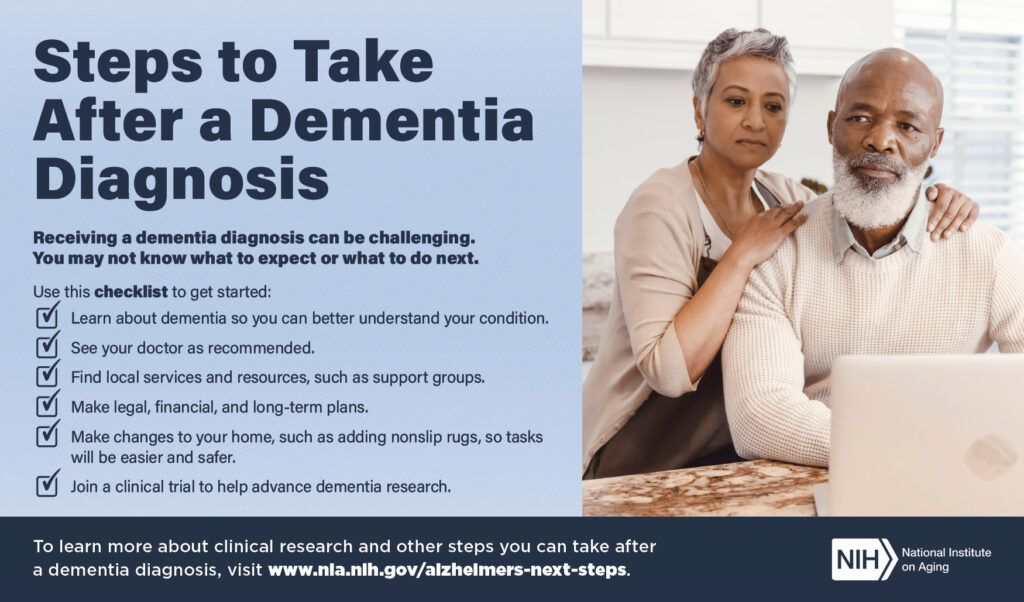Compassionate, Practical Advice for Caregivers of loved ones with Dementia.
Caring for someone with dementia is a journey that requires patience, flexibility, and a lot of heart. Memory loss, personality changes, and communication challenges can make daily life unpredictable—not just for your loved one, but for you and your family as well. Here are 10 nurse-approved tips to help you support your loved one with understanding, resilience, and hope.

1. Learn About Dementia & Its Stages
Knowledge is power. Understanding the type and stage of dementia your loved one has will help you anticipate changes and plan ahead. Familiarize yourself with common symptoms like memory loss, confusion, difficulty with language, and changes in mood or behavior.
Resource: Alzheimer’s Association: Types of Dementia.
2. Communicate with Patience and Simplicity
Speak slowly and use clear, simple sentences. Give one instruction at a time. Maintain eye contact and offer reassurance with your tone and body language. If your loved one becomes frustrated, take a break and try again later.
When a loved one with dementia says something that isn’t accurate, it’s usually best not to correct them directly. While it can feel natural to want to set the record straight, correcting can sometimes lead to frustration, embarrassment, or even agitation for your loved one. Instead, focus on validating their feelings and meeting them where they are in the moment.
Try to gently redirect the conversation or offer reassurance, rather than insisting on the facts. Remember, your loved one’s reality may be different from yours, and what matters most is their sense of comfort and connection—not the accuracy of every detail. Compassion, patience, and empathy go a long way in preserving trust and reducing stress for both of you.

3. Respond to Behavior, Not Just Words
Dementia can cause agitation, aggression, wandering, or repetitive questions. Instead of correcting or arguing, look for the feelings behind the behavior. Is your loved one scared, bored, or in pain? Address the emotion, and try to redirect their attention gently.
4. Create a Safe, Supportive Environment
Remove hazards like loose rugs or sharp objects. Install grab bars in bathrooms and keep pathways clear. Consider labeling drawers and doors, and use night lights to reduce confusion at night. We had the husband of one of our Alzheimer’s clients go to bed with a flashlight under the covers so he was ready and could see if she tried to get up during the night. This might seem a bit extreme but he was willing to do whatever it took to keep her safe and home with him.
5. Establish Routines
Predictability is comforting. Keep daily routines consistent—mealtimes, bathing, activities, and bedtime. Use calendars, clocks, and visual cues to help your loved one stay oriented.

6. Encourage Independence—But Be Ready to Step In
Allow your loved one to do as much as they are able, even if it takes longer. Offer choices (“Would you like tea or juice?”) and assist only when needed. This fosters dignity and self-esteem. Limit the choices to two if at all possible.
If they like doing the dishes make sure you replace the glass plates and glassware with plastic. This can help avoid breaking something as well as an injury. At the same time they are fulfilling a purpose in their mind.
Often the monotonous task of folding clothes or towels can be very calming for them.
7. Manage Common Challenging Behaviors
- Wandering: Ensure doors are secure, use alarms if needed, and keep recent photos on hand in case your loved one gets lost.
- Agitation or Aggression: Stay calm, speak softly, and try to identify triggers (pain, noise, hunger, or fatigue).
- Sundowning (late-day confusion): Keep the environment well-lit, limit caffeine, and maintain a soothing evening routine.
- Repetitive Questions: Answer patiently, then redirect to an activity or favorite object.
- What normally calmed them down in the past. What did they find comforting when they were stressed or upset. One of our Alzheimer’s clients when ever she would get agitated, fearful, or a bit paranoid we would take her into her bedroom where she had her Bible on the nightstand.
We picked a passage from Psalms (her favorite book of the Bible) and you could see the tension melt and she calmed down almost immediately. She was of a strong faith and would have Bible studies in her home and attended church regularly. It might be something completely different for your loved one.

8. Take Care of Yourself
Caregiver burnout is real. Ask for help from family, friends, or community resources. Take breaks, maintain your own health appointments, and consider joining a caregiver support group.
Resource: Family Caregiver Alliance: Caregiver Support
9. Stay Connected and Involve Others
Don’t try to do this alone. Involve other family members, friends, and your loved one’s healthcare team. Consider respite care or adult day programs for extra support and socialization.
10. Seek Professional Guidance When Needed
If you’re struggling with difficult behaviors, medication management, or care planning, reach out to a nurse advocate or dementia care specialist. Professional guidance can help you navigate challenges and access resources you might not know about. For a specialty provider consider neurology or a geriatric specialist that may be more experienced in those difficult dementia cases.
Resource:
- Your Nurse Advocate Consulting – Free Resources & Consults
- Alzheimer’s Association 24/7 Helpline: 1-800-272-3900
Additional Resources
- Alzheimer’s Association – Education, support, and local resources
- National Institute on Aging – Alzheimer’s Disease Resources
- Eldercare Locator – Connects you to local support services
- Institute for Safe Medication Practices – Tips on safe medication use
- Family Caregiver Alliance – Guides, webinars, and support groups
- What is Dementia-National Institue on Aging
Final Thoughts
Dementia changes a person’s world, but with the right support, you can help your loved one feel safe, valued, and cared for. Remember, you’re not alone on this journey—reach out, ask questions, and take care of yourself, too. If you need personalized advice or just a listening ear, our nurse advocates are here for you every step of the way.
Thank you for spending time with us this week. We’re so glad to be part of your journey in caring for your aging loved ones. It’s an honor to share resources, insights, and a little encouragement to support you along the way. We look forward to bringing you more helpful tools and compassionate guidance in the weeks ahead. See you back here soon!
With care,
Pam and Linda
Your Nurse Advocates
“Compassionate Care for Aging Adults Along with Peace of Mind for the Family”
About the Authors
At Your Nurse Advocate Consulting, Pam and Linda’s mission is to empower aging adults and their families to take control of their health, prepare for life’s uncertainties, and secure their peace of mind. We are dedicated to providing compassionate guidance, personalized support, and expert resources to help our clients navigate complex medical needs and organize their personal affairs.
As independent patient advocates we have a steadfast commitment to clarity, family well-being, and empowerment, we strive to make a meaningful impact by ensuring our clients feel confident, prepared, and cared for every step of the way on their healthcare journey.
Expert Guidance You Can Trust
With over 80 combined years of R.N. experience navigating the complex healthcare system, we stand as trusted guides for seniors and their families. Our expertise ensures they can access the care and resources they need without feeling overwhelmed by red tape or confusion.







